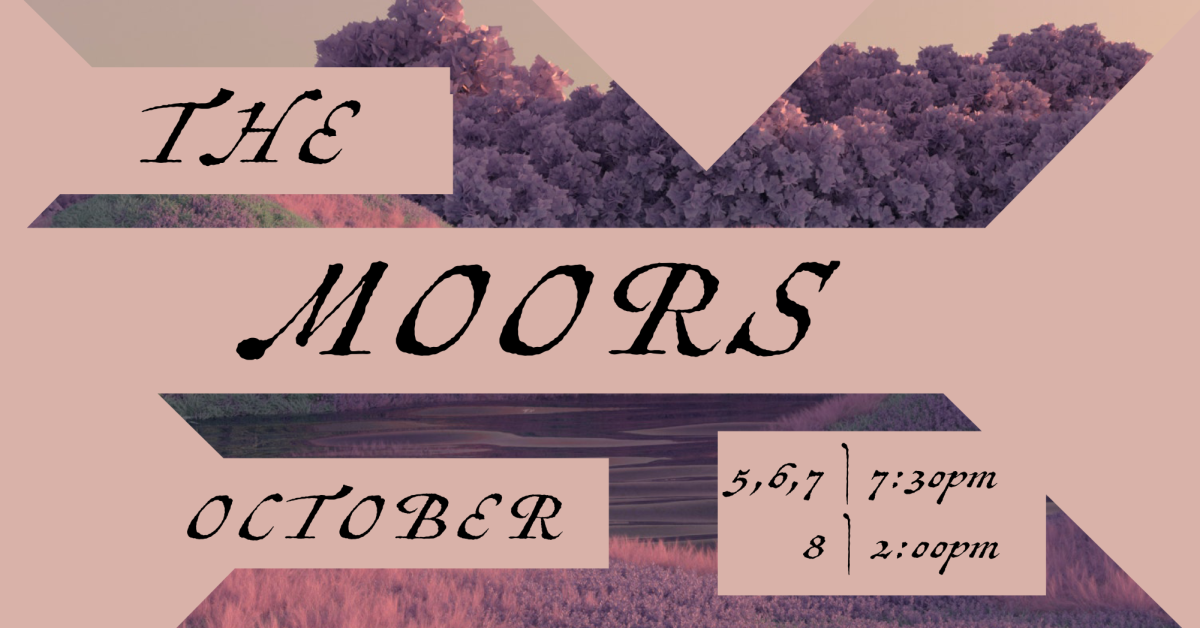Amidst a theatrical season of YA musicals and rococo-era satires, “The Moors” stands out as a play that defies genre classification. A mixture of the contemporary and the classic, the comedic and the creepy, the sarcastic and the sentimental, Jen Silverman’s 2016 thriller comes to Millikin at the time we need it most.
“The Moors” is an abstract Brontean pastiche that reveals the damaging effects of isolation. Many of us can relate to these thematic elements since the collective trauma of the pandemic. The story is about two sisters, practical and power-hungry Agatha and alternately childish and treacherous Huldey; their maid of many names; and their depressed Mastiff. The three coexist in isolation, but the arrival of a governess named Emily and an injured moorhen bring romance and murder into their lives.
The choice to put on a mainstage show that has a small cast like “The Moors” is an unusual one for Millikin. The faculty typically select larger productions to include more students. However, the big scale of the other shows selected this season allowed for director and adjunct Professor of Theater and Dance Denise Myers to tackle this ambitious play.
“It gave a lot of great acting opportunities to our acting majors,” Myers said. “So it turned out to be a perfect piece.”
Myers chose this play because of its brilliant writing. Though “The Moors” has many aesthetic signifiers of a period piece, the characters’ relationships with one another and the themes the show addresses are decidedly modern. Myers hoped the show would resonate with audiences today.
“It’s a gothic thriller, it’s funny, it has female empowerment and queer issues, and the themes of people wanting to be seen and to be heard, so it’s speaking to a lot of different audiences,” she said.
Collette Phillips, a senior BFA musical theater major who played the sisters’ maid, described the importance of the show’s messaging.
“‘The Moors’ has so many important issues about relationships and isolation and abuse, and it sparks that conversation and makes you think about what it means,” Phillips said.
Cooper Eidson, a senior BFA acting major who played the family’s mastiff, views the show as a kind of morality play. As the only male-presenting person in the production, Eidson thinks that, while the show highlights a lot of women’s issues, it also explores controlling patterns men can fall into in romantic relationships.
“With a cast of five women and one man, I think it’s really telling that the only male part in the play is playing a dog as well,” Eidson said.
Lots of preparation went into doing the script justice. Myers even used a chess board to help visualize the action in the show.
“A lot of times in blocking, you’re trying to figure out how to tell the story. I’d be at home and have little chess pieces I would move around and go, okay, I think this is it,” she said.
Myers also spent a week breaking down the script with the cast. This process allowed the cast to appreciate the material on a deeper level. Rather than focusing solely on the product, she incorporated students into the process.
“I feel like my job is to get the ball rolling and keep it rolling. It just became this big collaborative process,” Myers said. “I came to rehearsal every night excited to see what we would come up with.”
Collaboration was at the heart of this production. Myers uniquely chose to cast understudies for each individual role and incorporated them throughout the acting process. The principal cast and understudies benefitted from sharing the character work together.
Other professors also lent their expertise to the production, including Alex Miller, who acted as the fight choreographer for the play’s climactic murder, and Julia Moriarty, who was intimacy coordinator for the two on-stage kisses. The violence and intimacy highlighted the power struggle and explorations of sexuality between two women present throughout the show.
All of these elements come together to make for a highly theatrical experience. More so than most plays, “The Moors” asks audiences to suspend their disbelief. The show has many surreal elements, such as one maid pretending to be two people, one set acting as very different settings, and multiple characters acting as some strange combination of human and animal.
“We’ve got two people saying they’re a chicken and a dog, and that’s a weird relationship, but we want the audience to invest in their story,” Myers said. “The play was so theatrical in the sense of the lighting, the costumes, the sound, I hoped they would enjoy that and not get thrown off by it. And the way the actors did their parts, I think they made these weird things work.”
The cast faced several unique challenges when it came to their characters. Phillips, who played the family’s maid, developed multiple personas for her character, who switched between personalities depending on where she was working in the house.
“I wanted these characters to be so starkly different,” she said. “I honestly just played around with it and thought of things that would be funny to switch between but also that I could ground myself in.”
Eidson also had a challenging character to play as the mastiff, whose existential dread leads him to fall in love with a moorhen and ultimately kill her. Eidson enjoyed the complexity of the character.
“The ironic part about him is he’s a dog but he thinks like a human. And so it was really interesting to find the balance between dog and human,” they said.
The play ran from October 5-8. Taking the production to the stage brought lots of energy for the performers. Eidson noted how moments gained new meaning once they had an audience.
“We’ve heard a line for three weeks and we don’t think it’s funny and then all of a sudden we’re performing it in front of an audience and they think it’s hilarious,” Eidson said.
Phillips also appreciated the boost a live audience brought to their performances.
“When you have an audience the room just feels different. Your adrenaline’s up, the energy is up. It feels like it’s flying by,” she said.
So much passion went into this show. The script was ambitious and many of the parts challenging, but these challenges were a big part of the fun. The cast is sad to see it go, but will always cherish the experience.
“It was a hard show to work on,” Myers said, “But it was a pleasure to work on the hard stuff.”


